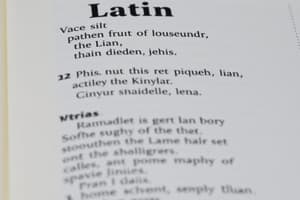Podcast
Questions and Answers
Match the following Latin words with their English meanings:
Match the following Latin words with their English meanings:
et = and non = not hunc = this illud = that
Match the following Latin prepositions with their correct meanings:
Match the following Latin prepositions with their correct meanings:
in = in, on cum = with ex = out of, from ad = to, towards
Match the following Latin pronouns with their forms:
Match the following Latin pronouns with their forms:
ego = I, me tu = you (sing.) is = he, she, it nos = we
Match the following verbs with their dictions:
Match the following verbs with their dictions:
Match the following Latin conjunctions with their functions:
Match the following Latin conjunctions with their functions:
Match the following Latin phrases with their interpretations:
Match the following Latin phrases with their interpretations:
Match the following Latin adjectives with their meanings:
Match the following Latin adjectives with their meanings:
Match the following Latin nouns with their translations:
Match the following Latin nouns with their translations:
Flashcards are hidden until you start studying
Study Notes
Key Vocabulary and Concepts
- Existential Verbs: Terms related to being and existence, such as "be," "exist," "have," and their various forms indicating tense and mood.
- Pronouns: Includes forms for identifying people and things, e.g., "who," "which," "you (sing.)," "he," "she," "it," with various possessive and reflexive forms.
- Prepositions and Conjunctions: Common prepositions like "in," "on," and "with," alongside conjunctions like "and," "but," "or," indicating relationships and conditions in sentences.
- Negation: Words like "not," "no one," and "neither...nor," used to express negation or absence.
Forms of Address and Actions
- Expressing Capability: The verb phrase "be able" denotes the ability to perform actions or fulfill tasks.
- Descriptive Adjectives: Terms like "great," "good," and "whole" provide qualitative descriptions of nouns.
- Action Verbs: Includes essential verbs such as "give," "see," "come," "do," "make," which form the backbone of various expressions.
Temporal and Spatial References
- Time Indicators: Words such as "now," "then," "day," and "time" help situate events in temporal contexts.
- Spatial Terms: Prepositions indicating locations like "between," "in this manner," "here," and forms indicating direction, such as "from," "out of," and "into."
Relationships and Familial Ties
- Familial Vocabulary: Terms like "father," "ancestor," and "house" that indicate relationships and domestic settings.
- Military and Civic Terms: Expressions like "rēs pūblica" (commonwealth) and "rēs mīlitāris" (art of war) convey essential concepts in governance and military.
Philosophical Concepts and Human Experience
- Life and Existence: Key themes include "life," "death," "human being," and "spirit," reflecting on the nature of existence and human conditions.
- Government and Order: Concepts such as "king," "war," and "stranger" suggest a focus on societal structures and emotional states.
Miscellaneous
- Comparative Structures: Terms like "how?" and comparative forms reveal nuances in questions and statements.
- Indefinite Pronouns: Vocabulary such as "some," "any," and "others" highlight quantity without specificity.
- Expressions of Intent: Verbs like "wish," "bear," and "endure" denote intentions and capacities beyond mere actions.
Studying That Suits You
Use AI to generate personalized quizzes and flashcards to suit your learning preferences.




